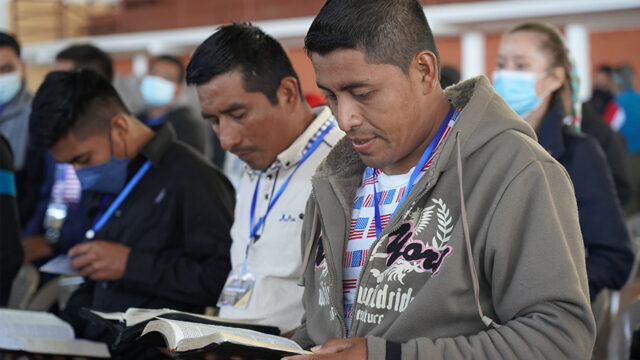Our Creator certainly knows how we can stay healthy.

“So if the Son sets you free, you will be free indeed” (John 8:36, NIV). Could robust spiritual health make one “free indeed,” even from health challenges?
According to the World Health Organization (WHO): “Health is a state of complete physical, mental, and social well-being and not merely the absence of disease or infirmity.”1
Dimensions of health include physical, emotional, social, environmental, and spiritual health. Even though spiritual health is not specifically mentioned in the definition articulated by the WHO, a closer look at the relationship between spiritual health and the other dimensions of health helps us appreciate that being spiritually healthy is an integral part of total health.
Spiritual Health and Physical Health
We often use physical health to define our health status. Disease and pain are sometimes looked at as reductions of our overall health. So we put much effort into avoiding unhealthy habits. But a primary emphasis on physical health can lead to a lack of appreciation about how spiritual health directly affects the physical health we seek to preserve.
Researchers have demonstrated that certain religious groups enjoy longer, healthier lives when compared to a society’s general populations. A correlation has also been established between healthy spirituality and avoiding certain physical conditions such as hypertension, cancer, Alzheimer’s disease, and cardiovascular disease.2 The question is to find out why this is so.
Three mechanisms have been highlighted: healthy behaviors, social support, and adherence to spiritual practice. Adherence to conventional norms of one’s spiritual community and its health behaviors have been noted as most significant. Denominations with strict lifestyle guidelines, such as Seventh-day Adventists, are healthier and live longer.3 Adherence to spiritual and/or religious norms lead to direct behavioral changes, avoidance of harmful substances, better lifestyle choices, and better physical health.
Ellen White emphasized the relationship between physical and spiritual health with this observation: “Let none who profess godliness regard with indifference the health of the body, and flatter themselves that intemperance is no sin and will not affect their spirituality. A close sympathy exists between the physical and the moral nature.”4
Spiritual Health and Environmental Health
The adage “cleanliness is next to godliness,” while not in the Bible, is used by many to indicate that God is concerned about our environment and its impact on our health. These include divine counsel about preventing contamination and disease during the Israelites’ wilderness sojourn, and how God instructed the children of Israel to bathe before they met with Him in sacred convocations.
A knowledgeable respect of a supernatural being who is conscious of environmental cleanliness produces people who see a direct relationship between themselves, God, and the environment. This invariably leads to better environmental health and contributes to enhanced spiritual health.
Spiritual Health and Social health
Ellen White highlighted the importance of social interaction in our total health: “In our association as Christians we lose much by lack of sympathy with one another. He who shuts himself up to himself is not filling the position that God designed he should. The proper cultivation of the social elements in our nature brings us into sympathy with others and is a means of development and strength to us in the service of God.”5
Social support among those who are spiritually healthy has been demonstrated to contribute to other health benefits.6 Conversely, many of today’s social ills stem from a sense of isolation and loneliness. Many feel vulnerable, as if they have to face life on their own. As social structures fall apart, spiritual consciousness is often the only remaining foundation.
Although the Bible speaks of God as our ultimate support, as in “When my father and mother forsake me, then the Lord will take care of me” (Ps. 27:10), even Jesus surrounded Himself with friends whom He described as “My mother and My brothers” (Matt. 12:49).
Spiritual Health and Mental Health
The mind controls all the decisions and actions one takes. In the words of WHO: “Mental health is defined as a state of well-being in which every individual realizes his or her potential, can cope with the normal stresses of life, can work productively and fruitfully, and is able to make a contribution to her or his community.”7
The leading clinical conditions that have negative effects to mental health, according to the WHO, include depression, stress, drug addictions, eating disorders, and suicide.
Harold Koenig, a professor of psychiatry and behavioral science, led a team that did a systematic review of data-based quantitative research published in peer-reviewed journals between 1872 and 2010 on religion, spirituality, and health. It found that spirituality had an overall inverse effect on suicide, anxiety, depression, almost all psychiatric conditions. Spiritually inclined people had positive character traits, a good sense of control, and generally score high on a happiness index regardless of denomination.8
Good spiritual health allows one to believe Jesus, as when He told His disciples, “Peace I leave with you, My peace I give to you; not as the world gives do I give to you. Let not your heart be troubled, neither let it be afraid” (John 14:27). In claiming such promises, we can find mental and emotional peace.
Communion with God is essential to our emotional and spiritual health. Many of us do not fully understand how prayer works or how to harness its power. Most do not fully understand how the phone connects people across oceans, yet we connect all the same. In the same manner, prayer is a powerful means of connecting with our Father in heaven and letting Him connect us with others.
With our current knowledge of the effects of lifestyle choices such as foods, life partners, media consumption, physical activity, etc., Adventists, through the Spirit of Prophecy and the Bible, have always had access to these counsels. Anyone whose spiritual commitment allows them to claim the promise of Jesus in John 13:17, “If you know these things, blessed are you if you do them,” could expect not only spiritual health from obedience to His Word, but balanced health in all aspects of life.
1 Constitution, World Health Organization (1948), www.who.int/about/mission/en/.
2 Harold G. Koenig, “Religion, Spirituality, and Health: The Research and Clinical Implications,” International Scholarly Research Notices (2012).
3 Linda K. George, David B. Larson, Harold G. Koenig, and Michael E. McCullough, “Spirituality and Health: What We Know, What We Need to Know,” Journal of Social and Clinical Psychology 19, no. 1 (2000): 102-116.
4 Ellen G. White, Counsels on Health (Mountain View, Calif.: Pacific Press Pub. Assn., 1923), p. 67.
5 Ellen G. White, Steps to Christ (Mountain View, Calif.: Pacific Press Pub. Assn., 1956). p. 101.
6 George et al.
7 www.who.int/features/factfiles/mental_health/en/
8 Koenig.








